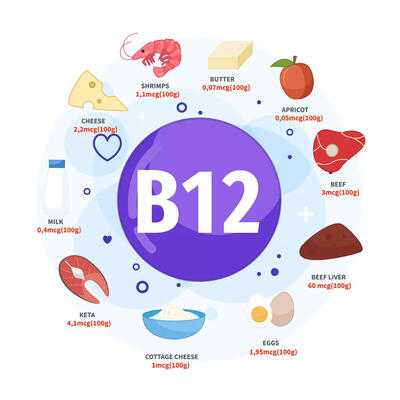If you find yourself constantly drained, struggling with brain fog, or battling unexplained weakness, the problem might not be lack of sleep but lack of vitamin B-12. Research highlighted by The Mirror and health experts at Mayo Clinic suggests that deficiencies in this essential nutrient could affect not just your energy levels but also your long-term brain health.
Why vitamin B-12 matters
Vitamin B-12, also known as cobalamin, is vital for the body’s production of healthy red blood cells and for supporting nerve function. It also helps create DNA, the genetic material that forms the blueprint of our cells. The vitamin plays a critical role in producing myelin, the protective coating around brain cells, which ensures smooth communication between them.
Without enough B-12, the body struggles to maintain these processes, leading to problems such as fatigue, muscle weakness, and even memory loss. Experts warn that over time, deficiencies can contribute to dementia risk, particularly among older adults. According to The Mirror, about 1 in 20 people over 60 and 1 in 10 over 75 may develop mental health conditions directly linked to this deficiency.
Symptoms to watch for
The signs of vitamin B-12 deficiency are often subtle at first but can worsen if left untreated. Reported symptoms include:

Who is most at risk?
While anyone can be deficient, certain groups are more vulnerable. Mayo Clinic notes that vegetarians and vegans may miss out since plant foods do not naturally contain B-12. Older adults, people with digestive conditions like Crohn’s or celiac disease, and those who have undergone stomach surgery also face absorption challenges.
Some medications, including proton pump inhibitors, can further reduce vitamin absorption, raising the risk of deficiency even in people with otherwise balanced diets.
How to get enough vitamin B-12
The recommended daily intake for adults is 2.4 micrograms, though older adults may need more due to reduced absorption. Rich dietary sources include meat, poultry, fish, and dairy products. Fortified breakfast cereals can also help. For people with severe deficiencies, healthcare professionals may prescribe oral supplements, injections, or even nasal sprays.
Feeling persistently tired is often brushed off as a side effect of modern life, but experts say it could be a warning sign of a deeper health issue. Ensuring adequate vitamin B-12 intake is not only key to boosting daily energy but also to protecting long-term brain and nerve health.
As researchers point out, prevention is far easier than treatment. A blood test can confirm deficiency — and for many, a small adjustment in diet or supplements could make a big difference.
Why vitamin B-12 matters
Vitamin B-12, also known as cobalamin, is vital for the body’s production of healthy red blood cells and for supporting nerve function. It also helps create DNA, the genetic material that forms the blueprint of our cells. The vitamin plays a critical role in producing myelin, the protective coating around brain cells, which ensures smooth communication between them.
Without enough B-12, the body struggles to maintain these processes, leading to problems such as fatigue, muscle weakness, and even memory loss. Experts warn that over time, deficiencies can contribute to dementia risk, particularly among older adults. According to The Mirror, about 1 in 20 people over 60 and 1 in 10 over 75 may develop mental health conditions directly linked to this deficiency.
Symptoms to watch for
The signs of vitamin B-12 deficiency are often subtle at first but can worsen if left untreated. Reported symptoms include:
- Persistent tiredness and low energy
- Pins and needles sensation
- A sore or red tongue and mouth ulcers
- Vision disturbances
- Shortness of breath, palpitations, and headaches
- Cognitive difficulties, including confusion, poor memory, or even depression
Who is most at risk?
While anyone can be deficient, certain groups are more vulnerable. Mayo Clinic notes that vegetarians and vegans may miss out since plant foods do not naturally contain B-12. Older adults, people with digestive conditions like Crohn’s or celiac disease, and those who have undergone stomach surgery also face absorption challenges.
Some medications, including proton pump inhibitors, can further reduce vitamin absorption, raising the risk of deficiency even in people with otherwise balanced diets.
How to get enough vitamin B-12
The recommended daily intake for adults is 2.4 micrograms, though older adults may need more due to reduced absorption. Rich dietary sources include meat, poultry, fish, and dairy products. Fortified breakfast cereals can also help. For people with severe deficiencies, healthcare professionals may prescribe oral supplements, injections, or even nasal sprays.
Feeling persistently tired is often brushed off as a side effect of modern life, but experts say it could be a warning sign of a deeper health issue. Ensuring adequate vitamin B-12 intake is not only key to boosting daily energy but also to protecting long-term brain and nerve health.
As researchers point out, prevention is far easier than treatment. A blood test can confirm deficiency — and for many, a small adjustment in diet or supplements could make a big difference.
You may also like

'Ready to meet Zelenskyy': Sergey Lavrov sets Putin okay with meeting Ukrainian President - but with this condition

Bombshell Epping migrant hotel case could redefine planning law enforcement

Five-word Conor Maynard statement after Traitors star forces baby paternity test

'Just like ceasefire with Pakistan': Congress says Centre 'cozying up with China'; hits out after TikTok website 'unblocked'

Shannon Matthews' mum Karen seen for first time since kidnap TV documentary






